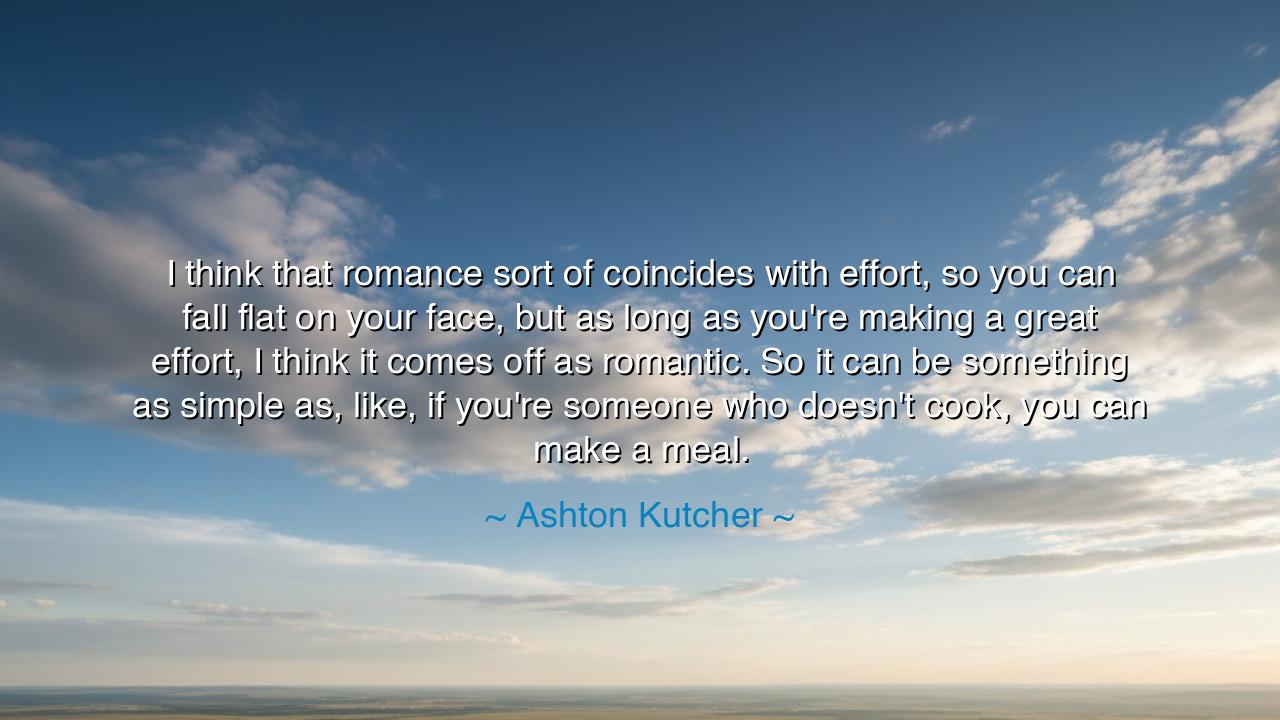
I think that romance sort of coincides with effort, so you can
I think that romance sort of coincides with effort, so you can fall flat on your face, but as long as you're making a great effort, I think it comes off as romantic. So it can be something as simple as, like, if you're someone who doesn't cook, you can make a meal.






"I think that romance sort of coincides with effort, so you can fall flat on your face, but as long as you're making a great effort, I think it comes off as romantic. So it can be something as simple as, like, if you're someone who doesn't cook, you can make a meal." These words spoken by Ashton Kutcher speak to the essence of romance—that it is not the flawless execution, but the genuine effort that imbues an action with meaning. Kutcher’s words reflect a deep truth: romance is not found in grand gestures alone, nor in the perfection of the act, but in the intention, the willingness to step outside of one’s comfort zone, and to give of oneself in a way that is both sincere and thoughtful. Romance, in its purest form, is a reflection of the heart’s effort to connect and to offer something meaningful, regardless of the outcome.
In the ancient world, romance was often bound to ritual and sacrifice, much like the great myths of old. Hercules, the legendary hero of Greek mythology, was known for his twelve labors—tasks that were so impossible they seemed to define him. Yet, it was not the outcome of these tasks that made Hercules truly heroic, but his willingness to undertake them in the first place. His journey was one of tremendous effort, often fraught with failure and hardship. In much the same way, true romance is not defined by perfect execution, but by the courage and commitment shown in the effort itself. Whether or not Hercules completed his labor flawlessly did not matter; what mattered was his dedication to the cause. Similarly, romance in its deepest form is marked by the effort to connect—even when the outcome is uncertain or imperfect.
Consider the story of Orpheus and Eurydice, where Orpheus’ love for his wife led him on a perilous journey to the underworld to retrieve her. He did not know if he would succeed, and in the end, he failed—looking back at Eurydice before they reached the surface, and losing her forever. Yet, despite the tragic failure, his effort—the sacrifice and love he exhibited—made his story one of deep romantic significance. In his attempt, he showed that true love is not about flawless success, but about the willingness to try, to risk, and to act from the heart. Romance, as Kutcher suggests, is born from the effort, even when the path is filled with obstacles and the end result is not what one hopes for.
This idea of effort as central to romance speaks to the essence of what it means to love—to give without expectation of perfection. Take, for example, the story of Penelope in Homer’s Odyssey, whose love and devotion to Odysseus were so profound that she waited for him for twenty years. Penelope faced immense challenges, yet her love was defined not by grand gestures, but by her unwavering commitment to the effort of maintaining her family and household in his absence. Her romantic dedication lay in the quiet consistency of her actions, in her ability to hold on to love even when it seemed like the world was falling apart. Like Kutcher’s idea of romance, Penelope’s story is one of effort, one that is sustained over time, regardless of immediate success or recognition.
In modern times, we often measure romance by spectacular moments—a grand gesture, a perfect date, or a flawless display of affection. But the ancient wisdom reminds us that true romance is not about those fleeting, perfect moments; it is about the effort behind them. Just as a warrior might face great odds and battle through countless challenges, so too does the lover face the challenge of showing love not in spectacular ways, but in the small efforts that accumulate over time. Kutcher’s example of cooking a meal, even if one is not a skilled cook, reflects the same sacrificial love that is woven throughout the stories of old. Romance is about doing what it takes to connect with another, even when the effort may not lead to immediate reward.
The lesson from Kutcher’s words is simple, yet profound: romance is about the effort—the quiet acts of love that might seem imperfect or humble, but are powerful because they are given with sincerity and a genuine desire to connect. Whether it’s making a meal for someone you love or making time for them amidst the busyness of life, it is the effort that matters most. Romance is not about achieving perfection, but about showing that you are willing to try, to give, and to show love in ways that may not be grand but are deeply meaningful.
So, to you, future generations: take these teachings to heart. Love is not found in grand gestures alone, but in the effort and consistency with which we care for one another. Whether you are offering a simple meal, a word of encouragement, or your time, know that these small acts of love build the foundation for something far greater than a fleeting moment. Love is born in the effort we make to show up, to be vulnerable, and to give ourselves, even if it means we fall short. In these efforts, true romance is found. Let your love be one of constant effort, and you will find it to be the most enduring and meaningful of all.






AAdministratorAdministrator
Welcome, honored guests. Please leave a comment, we will respond soon